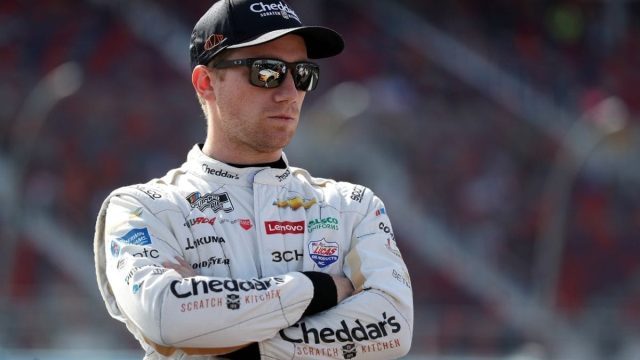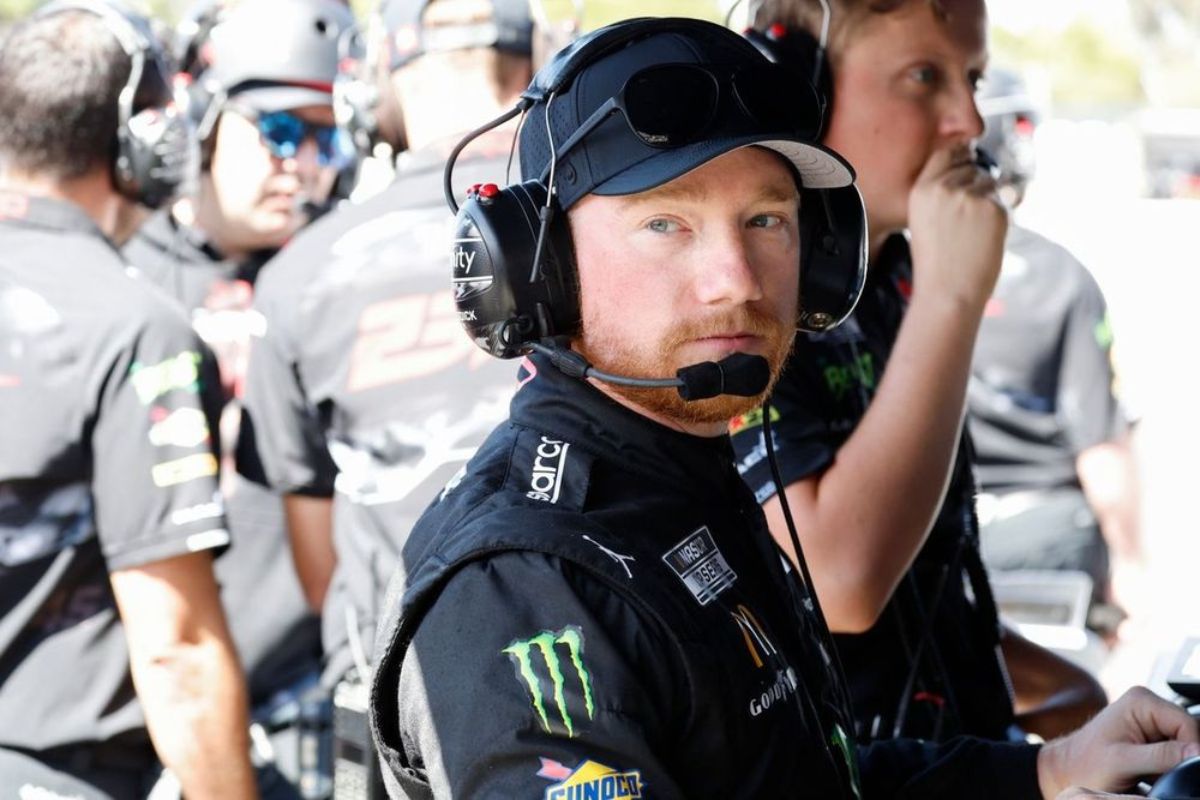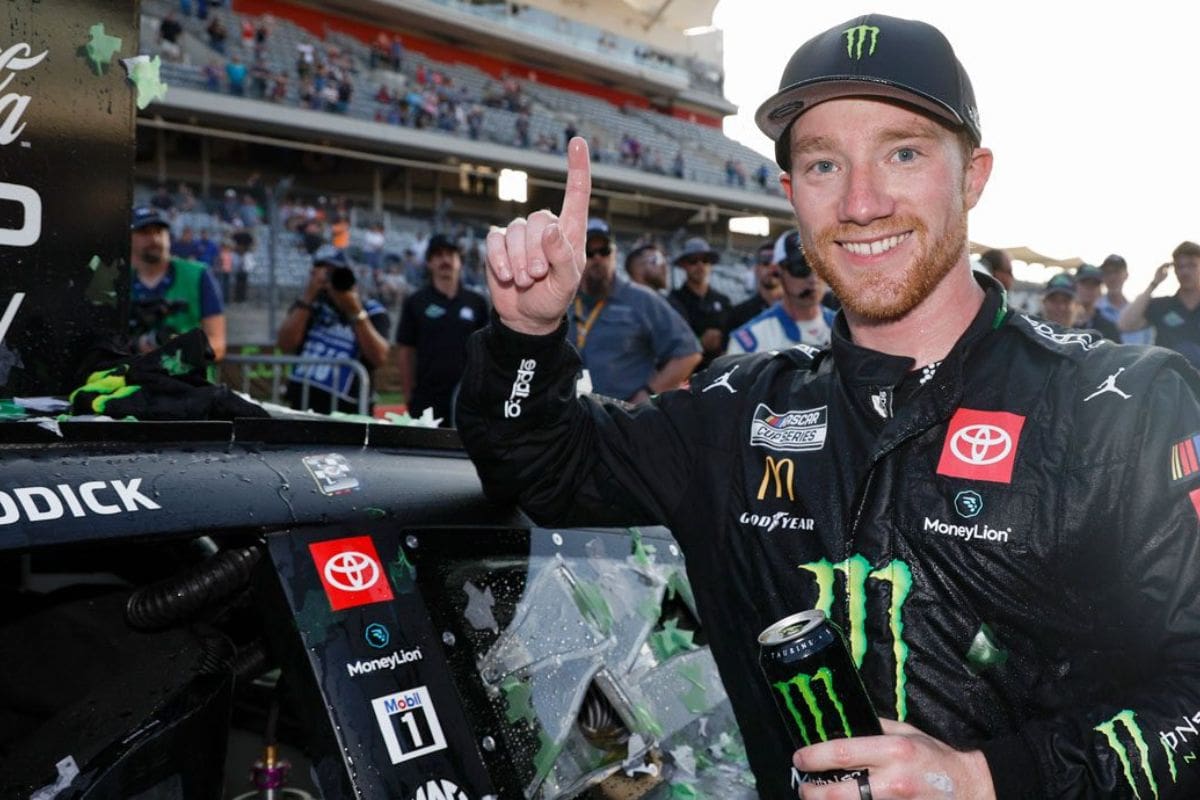Tyler Reddick Criticizes NASCAR Officials: Tyler Reddick‘s recent remarks regarding NASCAR officials’ inaction following the Richmond incident raise important questions about the integrity of racing standards and their broader implications for the sport’s image. His concerns stem from the perception that leniency towards aggressive driving could normalize unethical behavior, particularly among impressionable young fans. Reddick’s emphasis on the need for consistent rule enforcement highlights a critical dialogue about the responsibilities of both drivers and officials in shaping racing culture. As the conversation unfolds, the implications of these criticisms on NASCAR’s governance and fan engagement warrant further exploration.
Key Highlights
- Tyler Reddick criticized NASCAR for not penalizing Austin Dillon’s aggressive driving tactics during the Richmond race.
- Reddick expressed concerns that young fans may misinterpret leniency in officiating as acceptance of unethical behavior.
- He highlighted the need for consistent rule enforcement to promote sportsmanship and driver safety.
- Denny Hamlin echoed Reddick’s sentiments, advocating for clearer guidelines and stricter regulations.
Tyler Reddick Criticizes NASCAR’s Decision
Tyler Reddick has openly criticized NASCAR’s decision to overlook Austin Dillon’s controversial action during the final lap at Richmond, arguing it undermines the integrity of the sport and sets a troubling precedent for future competition. The incident in question involved Dillon executing a right-hook tactic on Joey Logano, resulting in Logano spinning out and ultimately losing his chance at victory. Reddick asserts that such actions should not go unpunished, as they could lead to a normalization of aggressive and reckless driving behaviors in the NASCAR community.
Reddick’s concerns reflect a broader apprehension regarding the governance of competitive racing and its implications for conduct on the track. By failing to penalize Dillon, NASCAR risks sending a message that intentional contact and aggressive tactics are acceptable strategies for securing wins. This could lead to an escalation of on-track incidents, compromising both driver safety and the spirit of fair competition.
Moreover, Reddick’s critique highlights the need for NASCAR to maintain consistent enforcement of its rules, reinforcing the importance of sportsmanship and respect among competitors. As a seasoned driver, Reddick understands the ramifications of such decisions on the sport’s image and its adherence to principles of fair play. The lack of accountability for Dillon’s actions raises questions about NASCAR’s commitment to preserving the integrity of racing, a fundamental aspect that fans and participants expect from the organization.
Reddick’s Concerns About Impact on Young Fans
Concerns have been raised about the potential negative influence of NASCAR’s recent decisions on young fans, particularly regarding their understanding of sportsmanship and acceptable behavior in competitive settings. Tyler Reddick’s comments reflect a broader anxiety among drivers and fans similarly, as he clarifies the challenge of conveying complex moral lessons to impressionable children who idolize athletes. Reddick highlights the troubling precedent set by decisions perceived as lenient or unjust, which may inadvertently suggest to young viewers that unethical behavior is permissible.
“I’m worried about what this does for the young kids watching the sport, my kids watching the sport.”
“My kid thinks it’s Ok, because NASCAR thinks it’s Ok. I needed to explain to him what happened, what’s not okay that’s the crazy precedence it is setting.” – Reddick
Reddick’s insights prompt a critical examination of NASCAR’s responsibility to uphold standards that not only entertain but also educate its younger audience. Ultimately, the integrity of the sport hinges on setting an example that aligns with the values of fairness and respect.
Reddick’s Specific Criticisms
What Reddick emphasizes is a troubling inconsistency in NASCAR’s officiating that could lead to dangerous interpretations of competitive behavior, especially among young fans. His remarks following the Richmond incident point to a crucial gap in the governing body’s enforcement of competitive conduct.
Reddick articulates a valid concern: if aggressive tactics, such as a “right-hook,” are tolerated in one race, it sets a precedent that could encourage similar actions in future races, including those bearing considerable implications, like championship events.
Reddick’s assertion that his four-year-old interprets such behavior as acceptable highlights a broader responsibility that NASCAR bears in shaping the perceptions of its younger audience. The driver emphasizes the potential for misinterpretation of aggressive driving as a legitimate tactic rather than a dangerous action that compromises safety. This inconsistency not only endangers drivers but also cultivates a culture where aggression is mistaken for competitiveness.
“My four-year-old thinks it’s okay to right hook somebody, potentially the driver’s side, into a wall because NASCAR thinks it’s Ok. That’s what I have a problem with. If what happened last night is Ok at Richmond, why would it not be Ok at Phoenix to win the championship?” – Reddick
🤔 "If what happened last night is okay at Richmond, why would it not be okay at Phoenix to win a championship?" #NASCAR@TylerReddick says the finish at @RichmondRaceway "doesn't sit well" with him and thinks it sets a dangerous precedent.
More → https://t.co/MKhd9eLXG8 pic.twitter.com/Je1w6vYjRj
— SiriusXM NASCAR Radio (Ch. 90) (@SiriusXMNASCAR) August 12, 2024
Furthermore, Reddick questions the rationale behind NASCAR’s decision-making: if actions deemed acceptable at Richmond are permitted, why would they not be permissible in a high-stakes race at Phoenix? His criticisms reveal a need for clearer guidelines and a more stringent enforcement policy to guarantee that safety remains paramount in competitive scenarios.
Denny Hamlin’s Reactions and Criticism
Joining Reddick in his critique of NASCAR’s officiating, Denny Hamlin has expressed strong disapproval of the incident involving Austin Dillon, accentuating the necessity for stricter enforcement of rules to maintain the integrity of the sport. Hamlin articulated his frustration over the perceived laxity in rule enforcement, particularly regarding actions that compromise fair competition. His remarks highlight a growing concern among drivers about the standards of conduct within the racing community.
“I mean that’s the thing is we have rules against you know to prevent ridiculous acts. But you know it’s been long time since those rules really have been enforced,”
“There’s no guardrails or rules that say don’t do that. And there’s no one in the tower that has any problem with it.” – hamlin
Hamlin’s commentary emphasizes the belief that recent racing incidents reflect a broader issue of accountability in NASCAR. He pointed out that the lack of explicit prohibitive measures allows for questionable tactics to proliferate, thereby threatening the sport’s foundational principles.
After not penalizing Austin Dillon for the move on the final lap, Denny Hamlin said NASCAR won't be taken seriously with officiating. pic.twitter.com/4SbjIrLTZq
— Bob Pockrass (@bobpockrass) August 12, 2024
Hamlin’s insistence on stricter regulations aligns with Reddick’s sentiment, reinforcing the notion that NASCAR must adapt to preserve its integrity. As drivers voice their concerns, it remains critical for NASCAR to address these issues proactively, guaranteeing that the sport remains competitive and fair for all participants.
Dillon’s Actions and Impact on the Race
Austin Dillon’s aggressive tactics during the race, particularly his collision with Joey Logano, not only secured him a path to victory but also raised significant questions about the implications of such strategies on competitive fairness in NASCAR.
Dillon’s actions, which included ramming into Logano and making contact with Denny Hamlin, demonstrate a growing trend where drivers prioritize results over sportsmanship. This behavior can have far-reaching consequences for the sport and its integrity.
- Competitive Integrity: When aggressive driving tactics are rewarded, it sets a precedent that may encourage reckless behavior among drivers, potentially compromising the spirit of fair competition.
- Fan Perception: Incidents like Dillon’s collision can alienate fans who value skill and strategy over aggressive actions. This could lead to a diminished respect for the sport, as supporters may view it as increasingly chaotic and less disciplined.
- Long-Term Consequences: While Dillon may benefit in the short term by qualifying for the 2024 NASCAR playoffs, the normalization of such aggressive tactics may cultivate a toxic competitive environment, prompting regulatory scrutiny and possible changes in NASCAR’s rules to preserve the integrity of racing.
News in Brief: Tyler Reddick Criticizes NASCAR Officials
In consideration of Tyler Reddick’s criticisms regarding NASCAR’s handling of the Richmond incident, concerns about the implications for young fans have been prominently raised.
The failure to penalize aggressive driving behaviors not only undermines the integrity of the sport but also poses a risk of normalizing unethical conduct for impressionable audiences.
Upholding consistent rule enforcement is crucial for preserving sportsmanship and ensuring that drivers serve as positive role models in the eyes of future generations of fans.
ALSO READ: Tyler Reddick’s Fabulous Marriage with Alexa Deleon: NASCAR Family Celebrates




What Austin Dylan did in the race is no different than the late. Dale Earnhardt Senior may rest in peace did his whole career.
I have seen worse. Lagono has done the same.I know Denny Hamlin has done the same thing. Dale Earnhardt did this himself Would you want to tell him. HELL NO other drivers have done the same thing. NASCAR is slowly doing.